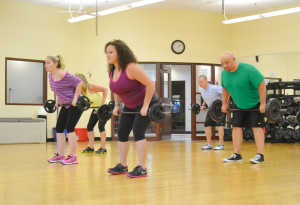by Michelle Sutton-Kerchner
It is not always what you eat but how you eat it that helps achieve weight loss goals …
Focus on these diet tips, whether you are eating pepperoni pizza or kale salad.
Sit and Socialize
Not every meal can double as quality time with family and friends. Capitalize on those times when it can. Plan ahead for meals when the family can all gather. Be sure to serve a well-balanced meal on these occasions, peppered with questions about loved ones’ latest happenings. Studies show children who regularly eat meals with family have a healthier body mass index.

Schedule adequate time for laughter, debates, and topics on upcoming events. Consider bringing an article or social network post to the table to share. Use it as a springboard for conversations that go beyond an exchange of essential information. Pull out a nice set of dishes to enhance the experience. One study found the same foods presented on different dish patterns were perceived differently. Food on the more attractive serving presentation was thought to be more flavorful. Forget sodium and sugar. Enhance your food with a set of appealing dishes!
Rethink the Family Meal

If dinnertime is a frantic rush of sports practices, late meetings, and post summer-camp showers, consider making breakfast a family meal. Little ones likely rise early enough for a family breakfast with pre-work time to spare. Or, gather at the day’s end for a healthy bedtime snack. If you can’t call it a bedtime snack without cookies and milk, leave the kitchen. Gather in the living room to listen to relaxing music and unwind with a book. Sweet cravings can be satisfied with non-edible alternatives. Give yourself a calorie-free serving of comfort.
Be An Intuitive Eater
Are you snacking (on healthy foods or otherwise) because you are hungry or because the food is there? Before you reach for the next bite, whether your first or you’re half through a meal, determine if you actually are hungry. Pay attention to your body’s signals. Perhaps you are eating because you are bored, stressed, tired, or your mother’s pie is simply too delicious to abandon. Regardless, if hunger isn’t your motivation, put down the fork and get fulfilled elsewhere.

Along with your incentive for eating, note how food affects your body and mind. This awareness provides motivation for making smart choices even when we crave the opposite. If you know refined carbs leave you sluggish, it will be easier to decline the macaroni-and-cheese and enjoy a garden salad instead. Learn which foods benefit physical and mental well-being, and determine how they affect you. Of course it is okay to treat yourself once and awhile to mac-and-cheese, but it could be best on a day you workout to counter its caloric and blood-sugar affects.
Slow Down
Eating is not an Olympic sport, despite the pace with which many rush down food. Numerous studies have proven an association between eating speed and body weight. One study reported people who eat quickly tripled their risk of becoming overweight compared to their slower-eating counterparts. Along with better recognizing when full and more fully appreciating each bite, slow eaters may simply run out of time to eat as much. Don’t deprive yourself the satisfaction of savoring. When it comes to food, quality and mindfulness often reduce the need for quantity.
A Diet-less Approach

Rather than focusing on what you should and should not eat, focus on creating quality dining experiences. From that mid-afternoon dark-chocolate moment to a full-course meal, how you eat is almost as important as what you eat. Try replacing restrictions with requirements. It may be the “ingredient” your diet is missing.
Sources
“The Faster You Eat, the More You Weigh?” by Amanda Chan at www.huffingtonpost.com
“Why Families Who Eat Together Are Healthier,” by Alexandra Sifferlin at Time.com
Image Credits
Bedtime story: flickr.com/photos/95072945@N05/12779343884/
Place setting: flickr.com/photos/dinnerseries/5261413989
 Fitness & Wellness News Your Source for Fitness News, Wellness News, Health News, and Nutrition News!
Fitness & Wellness News Your Source for Fitness News, Wellness News, Health News, and Nutrition News!




